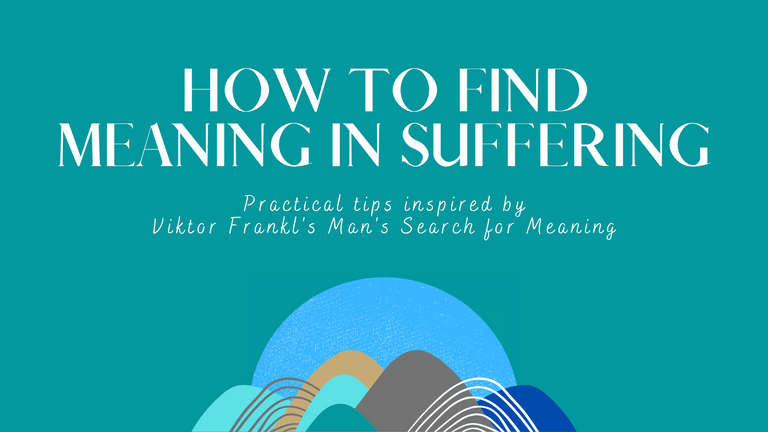

We don't need to suffer to find meaning in our lives, but we need to find meaning in our suffering to continue with our lives.

Suffering is such a strong word. When someone is suffering, we'd normally think that the person is going through some form of physical pain, a very distressing situation, or extreme poverty for an extended period of time. Each of us is going through some form of suffering, with others bearing heavier burdens than the more fortunate ones. Regardless of the scale of suffering that a person is going through, a defining moment for a particular suffering is when the person asks, "Why am I going through this?" or "Why is this happening?"
In this post, you don't have to be suffering to appreciate the tips I have distilled from Viktor Frankl's book. Let this be a practical guide to help you move through life and find meaning when going through both the slightest inconveniences or the most terrible experiences.
These tips are my own interpretations and interpolations, and although I want people to read the book, I also want to share my important learning with people who might need it but don't have the time and energy to finish the whole book.
I have decided to change my 2021 book reviews format because I felt like the format limits what I could share. This is the third in the series, and you can check out my previous reviews through the links below:

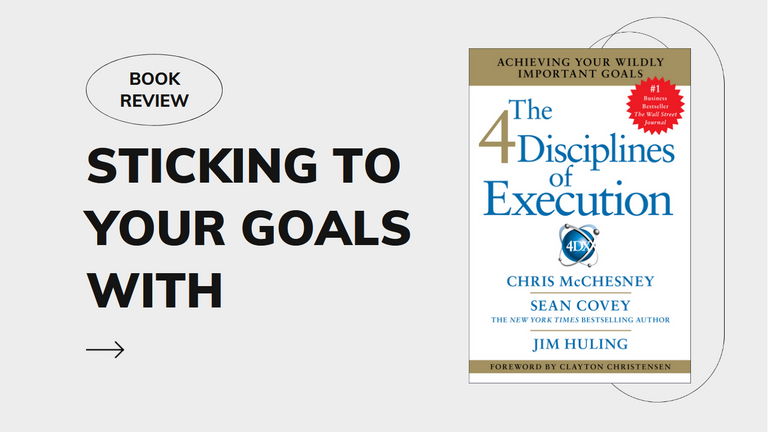
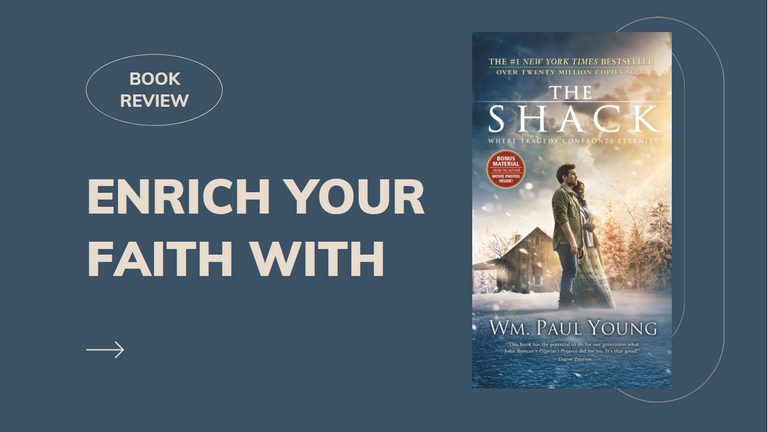

Before I dive into the tips, I would like to give a short background about the book. It's entitled Man's Search for Meaning. It was published in 1947 and was written originally in German by Viktor Frankl. The author was a psychologist who lived through the horrors of Nazi concentration camps. Faced with his own and other people's suffering, it was at those camps that he grounded his psychological approach and view of man's search for meaning despite the extreme suffering that he is going through.


TIP #1: Hold on to your inner freedom and personal value
Inner freedom is perhaps the focal point of the book. The start of taking charge of your life despite whatever state you're in is accepting the reality that you have been given the ultimate gift of inner freedom or free will. If you've read the 7 Habits of Highly Effective People, the author dedicates the first part of his book by talking about inner freedom as realized by Viktor Frankl during his time in the concentration camps. Inner freedom is the foundation to getting the life that you want.
To find meaning in suffering, you must hold on to your self-respect and personal value. Viktor described the men in the concentration camp who have lost their inner freedom and personal value to be like animals herded from one place to another without thought or will. To lose your personal value is to lose your sense of individuality.
But how do we do it? How do we hold on to our inner freedom and personal value? While the book does not give practical examples or steps, I will try to pick apart what the author wrote and share it with you in a summarized manner.
We give ourselves freedom when we look at our current states as temporary, and we hold on to the idea that there is still life after what we're going through right now. The prisoners who've given up hope are those who have succumbed to despair and stopped living for a better or different future. If you're going through something difficult right now, think of the life that you can still have in the future. It might not be the 'old normal' you knew or the perfect life you wanted, but it is a life worth living for. You can still set goals for yourself, and you can still achieve them.
Our personal value can come from the idea that someone or something needs us to be around because we matter. Of course, our own value should be based internally, but when we're in a state of great suffering, we must realize that life is still expecting something from us. We can think of our loved ones or the important work we're doing, or that still needs to be done to anchor us to finding meaning to our suffering.


TIP #2: Be worthy of your suffering
The next tip is to be worthy of your suffering. This tip is a matter of perspective. You scale your suffering by expanding your view from your own suffering to the suffering of others. The goal is not to invalidate your own suffering but to realize that it's not only you who's suffering, and others are suffering far greater than you. This realization brings to light the value of your own suffering and your reaction towards it.
Let me share a story about scaling your suffering through perspective:
Imagine your holding a handful of salt in one hand and a glass of water in another. You put all the salt in the water and let it dissolve. You taste the water. How does it taste? Very salty, I can imagine.
Now, imagine there is a big lake in front of you. You pour your glass of saltwater into the lake, and then you take a bit of lake water, and you taste it. Does it still taste salty? Maybe a little, right? But is it as salty as your glass of water earlier? Of course, not.
Every one of us is carrying our own burdens and going through our own suffering. But this does not mean that the world is full of suffering. There is still so much more out there, so much space for things in life other than suffering. When we hold on to our own suffering, we concentrate its effect on our lives. Instead, we must look at the world and see how there are still people who choose to move through life and take opportunities despite all the suffering.
In the book, Viktor shares his view on how we can be worthy of our suffering. For him, we can do this by thinking lovingly of the persons we hold dear in our lives. Just the thought of them filling our heads can affirm the difficult things we're going through. For Viktor, it was his wife, and there was even no assurance that she was still alive and waiting for him. The mere memory of his wife was enough to keep him going through his suffering in an "honorable way."

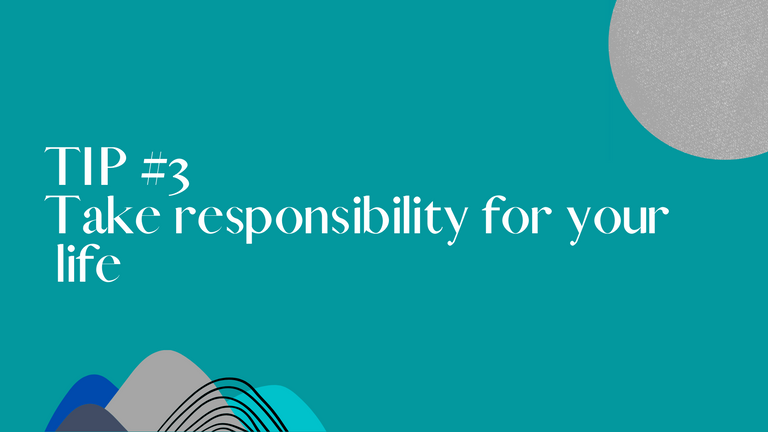
TIP #3: Take responsibility for your life
According to Viktor, "Man should not ask what the meaning of his life is, but rather he must recognize that it is he who is asked. Each man is questioned by life, and he can only answer to life by answering for his own life; to life, he can only respond by being responsible."
The third tip is anchored on the first tip. After realizing your personal freedom, the next logical step is to use that freedom to steer your life as you should be by taking all the responsibility for it. The foreword of the book contains the words, "You cannot control what happens to you in life, but you can always control what you will feel and do about what happens to you."
To find meaning in suffering, we must also be able to find meaning in our lives. And to do this, the book tells us to pour our efforts into a fulfilling activity or by changing our attitude towards unavoidable suffering. To be responsible for our lives is to continue working for it. Focus on the work you need to do and the work you need to do on yourself. To be responsible for our lives is to challenge ourselves to change when we can no longer change our situation. There is a way to turn your tragedy into triumph. There is learning in everything. Go deep into the reason and the opportunities that you can get from your suffering.


TIP #4: Practice a bit of logotherapy
Viktor Frankl was a practioner of logotheraphy. It is a form of psychotherapy that makes us look to the future and in our ability to overcome suffering by finding meaning in our lives. According to the book, "Logotherapy sees in responsibleness the very essence of human existence." Logotherapy is a broad and rich field of study. Of course, we can't fully practice it on our own, but we can borrow some of its ideas to help us find meaning in our suffering.
In logotherapy, there is a technique called "paradoxical intention." This technique can be used when facing difficult situations or terrifying events. What you do is to counter fear with "hyper-intention" and humor. It's paradoxical because you will think that whatever it is you're fearing will happen in a worse way. This technique should be coupled with 'detachment' to prevent yourself from taking in all the fear and the emotions when you imagine the bad thing that's going to happen. Detachment is taking a step back from yourself and viewing the situation as a witness rather than a participant. I've written a post about detachment, and you can read it through here.
For example, the book talks about a physician with a bad case of perspiration whenever he meets someone. Using the technique, when he's anxious to meet someone, he would say to himself that he would be perspiring so hard he'd wet his clothes. For just a week, he could cure himself of the condition that he suffered for four years. Another example is a bookkeeper who suffered from a writer's cramp. As a solution, she was told to write the worst way she can, and she found out that she could not help but write very legibly. She was cured of her condition.
Using paradoxical intention, we free ourselves from the paralyzing fear that grips us when we're faced with a dreadful experience. And when we free ourselves from the emotions elicited by our suffering, we can better understand what we need to do to move forward or cure ourselves.

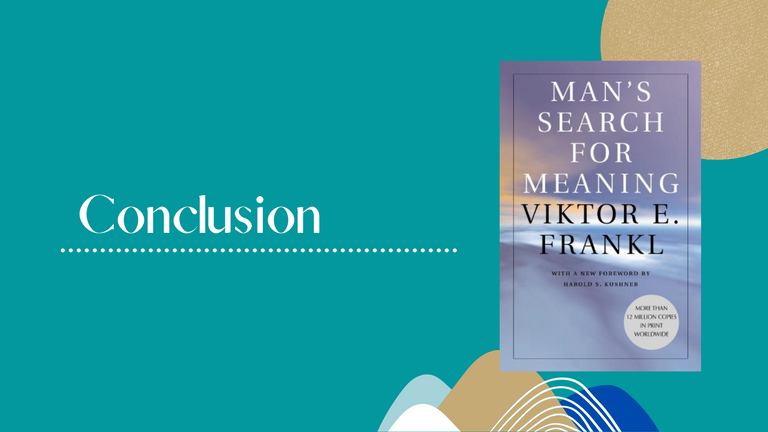
Conclusion
To find meaning in suffering, we must take hold of our free will and value. We must scale our suffering by widening our perspective and honoring the important people in our lives. We can overcome suffering by taking responsibility for our lives through fulfilling work or changing our attitude. Lastly, we can help ourselves find meaning in suffering by using a technique that helps alleviate the effects of difficult situations.

And that's it! Thank you so much for reading my blog, and I hope I was able to impart some kernels of wisdom to you. I really enjoyed reading the book and writing this post. I know I will be writing more of these posts from the other books I've read this year. Watch out for them in the future. See you in the next post. Cheers!
Images were created using Canva.com. Image of book cover obtained from Amazon.com.


The rewards earned on this comment will go directly to the person sharing the post on Twitter as long as they are registered with @poshtoken. Sign up at https://hiveposh.com.
Congratulations @glecerioberto! You have completed the following achievement on the Hive blockchain and have been rewarded with new badge(s) :
Your next target is to reach 500 replies.
You can view your badges on your board and compare yourself to others in the Ranking
If you no longer want to receive notifications, reply to this comment with the word
STOPCheck out the last post from @hivebuzz:
this is one of the greatest books there is. These book has being enlisted in various must-read book list and I came across it a few months ago, I still haven't gotten around to opening. Hopefully you have done the trick, lol.
Congratulations @glecerioberto! You received a personal badge!
You can view your badges on your board and compare yourself to others in the Ranking
Check out the last post from @hivebuzz:
I always try to bring it back to focus. We always have control over our focus, at least if we temper that skill. Everything else will be painted by that
Great write up!